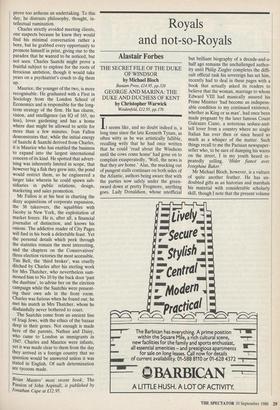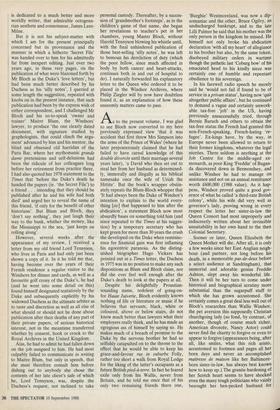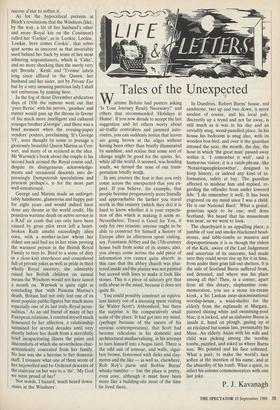Royals and not-so-Royals
Alastair Forbes
THE SECRET FILE OF THE DUKE OF WINDSOR by Michael Bloch
Bantam Press, £14.95, pp.326
GEORGE AND MARINA: THE DUKE AND DUCHESS OF KENT by Christopher Warwick
Weidenfeld, £12.95, pp.176
It seems like, and no doubt indeed is, a long time since the late Kenneth Tynan, as often witty as he was artistically fallible, recalling wrily that he had once written that he could 'read about the Windsors until the cows come home' had gone on to complain exasperatedly, 'Well, the news is that they are home.' Alas, the mucking out of pungent stalls continues on both sides of the Atlantic, authors being aware that with the parties now safely under the green- sward down at pretty Frogmore, anything goes. Lady Donaldson, whose unofficial
but brilliant biography of a decade-and-a- half ago remains the unchallenged author- ity until Philip Ziegler completes the diffi- cult official task his sovereign has set him, recently had to deal in these pages with a book that actually asked its readers to believe that the woman, marriage to whom Edward VIII had manically assured his Prime Minister 'had become an indispens- able condition to my continued existence, whether as King or as man', had once been made pregnant by the later famous Count Galeazzo Ciano, a notorious seduce-and- tell lover from a country where no single Italian has ever then or since heard so much as a whisper of the matter. Such things recall to me the Parisian newspaper- seller who, to be sure of dumping his wares on the street, I in my youth heard re- peatedly yelling, 'Hitler fiancé avec. Josephine Baker.'
Mr Michael Bloch, however, is a vulture of quite another feather. He has un- doubted gifts as an historian and marshals his material with considerable scholarly skill, though I note that the present volume is dedicated to a much better and more worldly writer, that admirable octogena- rian aesthete and connoisseur, James Lees- Milne.
But it is not his subject-matter with which I am for the present principally concerned but its provenance and the manner in which a hitherto 'Secret File' was handed over to him for his admittedly far from inexpert editing. Just over two years ago, in these very pages, on the publication of what were blazoned forth by Mr Bloch as the Duke's 'love letters', but had been much better described by his Duchess as his 'silly notes', I queried at some length the suggestion, repeated with knobs on in the present instance, that such publication had been by the express wish of either correspondent, and I challenged Mr Bloch and his so-to-speak 'owner and trainer' Maitre Blum, the Windsors' lawyer, to produce 'the one clearly dated document, with signature studied by graphologists, that could clinch the argu- ment' advanced by him and his mentor, the blind and obsessed old harridan of the Paris Bar, where her mythomanic grande dame pretensions and self-delusions had been the ridicule of her colleagues long before her retirement from practice there. I had also quoted her 1978 statement to the Times that 'before the Duke's death he handed the papers (ie. 'the Secret File') to a friend . . . intending that they should be published after he and his wife had both died' and urged her to reveal the name of this friend, 'if only for the benefit of other historians'. But Blum and Bloch, they `don't say nothing', they just laugh their way to the bank, whither the money, like the Mississippi to the sea, 'just keeps on rolling along'.
However, several weeks after the appearance of my review, I received a letter from my old friend Lord Tennyson, who lives in Paris and had only just been shown a copy of it. In it he told me that, having become over the years of their French residence a regular visitor to the Windsors for dinner and cards, as well as a favourite golf crony of the Duke's, he had (and he went into some detail on this) found himself designated tentatively by the Duke and subsequently explicitly by his widowed Duchess as the ultimate arbiter as to taste and discretion as well as all else of what should or should not be done about publication after their deaths of any part of their private papers, of serious historical interest, not in the meantime transferred whether by consent, hook or crook to the Royal Archives in the United Kingdom.
Alas, he had to admit he had fallen down on the job assigned to him. He had most culpably failed to communicate in writing to Maitre Blum, but only in speech, that she must therefore consult him before dishing out to anybody she chose the contents of her late client's safe of which he, Lord Tennyson, was, despite the Duchess's request, not inclined to take personal custody. Thereafter, by a succes- sion of 'grandmother's footsteps', as in the children's game of that name, she began her revelations to teacher's pet in her chambers, young Master Bloch, without Harold Tennyson blowing his whistle until, with the final unhindered publication of those best-selling 'silly notes', he was left to bemoan his dereliction of duty (which the poor fellow, since much affected in body by both cancer and heart-attacks, continues both in and out of hospital to do). I naturally forwarded his explanatory letter to the Queen who ordered it to be placed in the Windsor Archives, where Philip Ziegler will by now have doubtless found it, as an explanation of how these unseemly matters came to pass.
As to the present volume, I was glad to see Bloch now converted to my here previously expressed view 'that it was accident that first threw Mrs Simpson into the arms of the Prince of Wales' (where he later preposterously claimed that he had failed to have carnal knowledge of this double divorcee until their marriage several years later), 'a David who then set out to steal her from her husband as determined- ly, immorally and illegally as his biblical namesake once the wife of Uriah the Hittite'. But the book's wrapper obstin- ately repeats the Blum-Bloch whopper that `It had always been the Duke of Windsor's intention to explain to the world every- thing [sic] that happened to him after the abdication', a statement Bloch now most absurdly bases on something told him (and since repeated to the Times at his sugges- tion) by a temporary secretary who has kept green for more than 30 years the crush she developed on the Duke when reminisc- ence for financial gain was first inflaming his egocentric paranoia. As the disting- uished biographer Hugo Vickers has pointed out in a Times letter, the Duchess in 1975 was in no position to make any such dispositions as Blum and Bloch claim, nor did she ever feel well enough after the Duke's death to look at the papers at all.
Despite his delightfully Proustian- sounding name, redolent of going-on- for Haute Juiverie, Bloch evidently knows nothing of life or literature or music if he believes that servants, black, white or coloured, above or below stairs, do not know much better than lawyers what their employers really think, and he has made an egregious ass of himself by saying so. He makes much of a breach of promise to the Duke by the nervous brother he had so selfishly catapulted on to the throne to the effect that he would be able to keep his grace-and-favour rus in suburbe Folly, rather too short a walk from Royal Lodge for the liking of the latter's occupants as a future British pied-a-terre. In fact he feared exile only from his Wallis, never from Britain, and he told me once that of his only two remaining friends there one, `Burghie' Westmoreland, was now a dip- somaniac and the other, Bruce Ogilvy, an undischarged bankrupt, and to the late Lilli Palmer he said that his mother was the only person in the kingdom he missed. He himself not only broke his abdication declaration 'with all my heart' of allegiance to his brother but also, by the same token, disobeyed military orders in wartime though the pathetic last 'Coburg bow' of his emaciated head to his kindly niece was certainly one of humble and repentant obedience to his sovereign.
In his farewell radio speech he merely said he 'would not fail if found to be of service in a private status', having now 'quit altogether public affairs', but he continued to demand a vague and certainly unwork- able tax-free 'job' in the US, having previously unsuccessfully tried, through Bernie Baruch and others to obtain the tax-free status the French had granted this non-French-speaking, French-hating 're- fugee'. Ex-kings have, by the way, in Europe never been allowed to return to their former kingdoms, whatever the legal niceties. There seldom is anything at the Job Centre for the middle-aged ex- monarch, as poor King 'Freddie' of Bugan- da discovered down in Bermondsey, and unlike Windsor he had to manage on assistance and not on an annual remittance worth £600,000 (1988 value). As it hap- pens, Windsor proved quite a good gov- ernor of what he called 'a third-rate British colony', while his wife did very well as governor's lady, proving wrong in every respect the letter her sister-in-law the Queen Consort had most improperly and indiscreetly written about her invincible unsuitability in her own hand to the then Colonial Secretary.
Sooner or later, Queen Elizabeth the Queen Mother will die. After all, it is only a few weeks since her East Anglian neigh- bour (and partner, not long before his death, in a memorable pas-de-deux before a select audience at Sandringham), that immortal and adorable genius Freddie Ashton, slept away his wonderful life. Then it will be her turn to come under historical and biographical scrutiny more substantial than the sugarpuff stuff to which she has grown accustomed. She certainly comes a great deal less well out of Bloch's researches than Wallis Windsor, the pet aversion this supposedly Christian churchgoing lady (so fond, by contrast, of another, though of course much richer, American divorcée, Nancy Astor) could never find the charity to forgive or even to appear to forgive (appearances being, after all, like smiles, what this rich aristo, accustomed to footmen and pages all her born days and never an accomplished maitresse de maison like her Baltimore- born sister-in-law, has always best known how to keep up.) The granite hardening of her Scotch heart seems to have shocked even the many tough politicians who vainly besought her hen-pecked husband for
raisons d'etat to soften it.
As for the hypocritical protests at Bloch's revelations that the Windsors (like, by the way, a lot of her husband's other and more Royal kin on the Continent) called her 'Cookie', as in `Lookie, Lookie, Lookie, here comes Cookie', that sobri- quet seems as innocent as that invariably used behind her back by some of her most admiring acquaintances, which is 'Cake', and no more shocking than the surely very apt 'Brenda', 'Keith' and 'Yvonne' labels long since affixed to the Queen, her husband and her sister, not by Private Eye but by a very amusing patrician lady I shall not embarrass by naming here.
In the fog of those December abdication days of 1936 the rumour went out that `poor Bertie' with his nerves, 'gnashes' and stutter would pass up the throne in favour of his much more intelligent and cultured younger brother ;Georgie', and there was a brief moment when the evening-paper vendors' posters, proclaiming 'It's George VI', were thought by some to presage a gloriously beautiful Queen Marina as Con- sort, and many of us rejoiced at the idea. Mr Warwick's book about the couple is his second hack around the Royal course and, despite its disingenuous acknowledge- ments and occasional descents into de- pressingly Dempsterish speculations and prurient perhaps's, is for the most part well-intentioned.
George and Marina made an unforget- tably handsome, glamorous and happy pair for eight years and would indeed have done any throne in the world credit. His pointless wartime death on active service in a RAF air crash that can only have been caused by gross pilot error left a heart- broken Ruth amidst exceedingly alien corn, with a mother-in-law whom her eldest son said had ice in her veins proving the warmest person in the British Royal Family to turn to. Bred to a sense of duty in a close-knit sisterh000 and cousinhood full of private jokes as well as pride in their wholly Royal ancestry, she admirably raised her British children on annual means the Windsors would not have lasted a month on. Warwick is quite right in concluding that 'with Princess Marina's death, Britain had not only lost one of its most popular public figures but much more especially one of its last truly Royal perso- nalities.' As an old friend of many of her European relations, I counted myself much honoured by her affection, a relationship sustained for several decades until very shortly before her death from a mercifully brief incapacitating illness the pains and discomforts of which she nevertheless char- acteristically concealed from her family. No less was she a heroine to her domestic staff. I treasure what one of them wrote of her bejewelled and be-Ordered descents of the staircase on her way to a 'do'. 'My God we were proud of her!'
Not words, I hazard, much heard down- stairs at the Windsors'.
























































 Previous page
Previous page